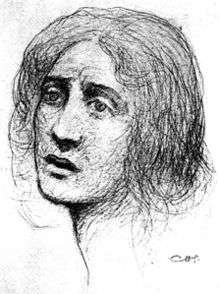Al-Khansa
| Al-Khansa الخنساء | |
|---|---|
 "Al-Khansa’", drawing by Kahlil Gibran | |
| Born |
575 Najd, Arabia |
| Died |
645 (aged 69–70) Najd, Arabia |
| Occupation | poet |
Tumāḍir bint ʿAmr ibn al-Ḥarth ibn al-Sharīd al-Sulamīyah (Arabic: تماضر بنت عمرو بن الحرث بن الشريد السُلمية ), usually simply referred to as al-Khansā’ (Arabic: الخنساء) (meaning either "gazelle" or "snub-nose") was a 7th-century Arabic poet (said to have died in 646 CE[1]). She is the best known female poet in Arabic literature.[2]
In her time, the role of a female poet was to write elegies for the dead and perform them for the tribe in public oral competitions. Al-Khansa’ won respect and fame in these competitions with her elegies for her brothers, Ṣakhr and Muʿāwiyah, who had died in battle.
Life
Al-Khansa’ was born and raised in Najd, Arabia, into a wealthy family. She was a contemporary of Muhammad, and eventually converted to Islam.
In 612, her brother Muʿawiyah was killed by members of another tribe. Al-Khansa’ insisted that her brother, Sakhr, avenge Muʿawiyah's death, which he did. Sakhr was wounded in the process and died of his wounds a year later. Al-Khansa’ mourned his death in poetry and gained fame for her elegiac compositions.
She had four sons: Yazīd, Muʿāwiyah, ʿAmr, and ʿAmrah, all of whom converted to Islam. All four of her sons were killed in the Battle of Qadisiyah.
When she received the news, she did not grieve, but said, "Praise be to Allah who honored me with their martyrdom. And I have hope from my Lord that he will reunite me with them in the abode of his mercy." (Arabic: الحمد لله الذي شرفني بقتلهم، وأرجو من ربي أن يجمعني بهم في مستقر رحمته).[3]
Critical reception
The contemporaneous Arabic poet al-Nābighah al-Dhubyānī said to her: You are the finest poet of the jinn and the humans." (Arabic: إنك أشعر الجن والإنس) [4]
Another anecdote says that al-Nabigha told al-Khansa "If Abu Basir[5] had not already recited to me, I would have said that you are the greatest poet of the Arabs. Go, for you are the greatest poet among those with breasts." Al-Khansa replied, "I'm the greatest poet among those with testicles, too." [6]
See also
References
- ↑ Abdullah al-Udhari, Classical Poems by Arab Women (London: Saqi, 1999), p. 58.
- ↑ Classical Arabic Literature: A Library of Arabic Literature Anthology, trans. by Geert Jan van Gelder (New York: New York University Press, 2013).
- ↑ Al-Dughmi, Muhammad Rakan (1985). Al-Tajassus wa ʾaḥkāmuhu fī al-sharīʿah al-ʾislāmīyyah. Beirut: Dār al-salām. p. 193.
- ↑ Ibn Qutaybah (1987). al-Shiʿr wa-al-shuʿarā’. Beirut: Dār ʾAḥyāʾ al-ʿUlūm. p. 218.
- ↑ http://encyclopedia2.thefreedictionary.com/Asha
- ↑ Ghazoul, Ferial Jabouri (2008). Arab Women Writers: A Critical Reference Guide, 1873-1999. Cairo: American University in Cairo Press. p. 1. ISBN 978-977-416-146-9.
External links
- "A Great Arab Poetess of Elegy", an essay about Al-Khansa
- Other Women's Voices collection, contains links, secondary sources, and excerpts
- Project Continua: Biography of al-Khansa